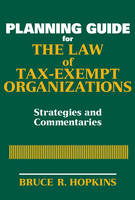
Planning Guide for the Law of Tax-Exempt Organizations
John Wiley & Sons Inc (Verlag)
978-0-470-14917-1 (ISBN)
An indispensable reference tool, offering professionals hands-onlegal and tax planning tips An essential guide for professionals representing and advising tax-exempt organizations, Planning Guide for the Law of Tax-Exempt Organizations offers a wide variety of practical planning tips, guidance, and helpful information for better meeting clients' needs. This essential companion to the bestselling The Law of Tax-Exempt Organizations, Ninth Edition is a valuable, go-to resource for lawyers and accountants, directors and officers of nonprofit organizations, as well as managers and consultants for tax-exempt organizations.
Written by the leading legal authority in the nonprofit sector, Planning Guide for the Law of Tax-Exempt Organizations features a digest of recent legislation, court opinions, and IRS public and private rulings, as well as checklists of forms and an inventory of penalties.
Additionally, it features commentaries designed to provide guidance and perspective to tax-exempt professionals and organizations as to how to cope with the developments in the law affecting their practices and the operation of their programs.
Bruce R. Hopkins is the country's leading authority on tax-exempt organizations and is a senior partner with the firm Polsinelli Shalton Flanigan Suelthaus PC. He is also the author of nineteen books, including The Law of Tax-Exempt Organizations, Ninth Edition, Nonprofit Law Made Easy, 650 Essential Nonprofit Law Questions Answered, The Law of Fundraising, Third Edition, Private Foundations: Tax Law and Compliance, Second Edition, The Tax Law of Charitable Giving, Third Edition, The Law of Intermediate Sanctions, and The Law of Tax-Exempt Healthcare Organizations, Second Edition, as well as the newsletter Bruce R. Hopkins' Nonprofit Counsel, all published by Wiley.
Chapter 1 Form of Organization and Governance Principles 1
Basic Decision: Nonprofit or For-Profit 1
Location 2
Form of Organization 4
Name 8
Governing Board 9
Officers 14
Key Employees 17
Management Companies 17
Minutes 17
Other Documents 19
Corporate Governance Principles 20
Board Member Responsibilities and Duties 21
Protections against Personal Liability 24
Minimizing Board Member Liability 25
Watchdog Agencies 29
Chapter 2 Acquisition and Maintenance of Tax-Exempt Status 37
Nonprofit Organizations 37
Concept of Tax Exemption 37
Eligibility for Tax-Exempt Status 38
Categories of Tax-Exempt Organizations 38
Determining Appropriate Category of Tax Exemption 39
Concept of Recognition of Tax Exemption 41
Applying for Recognition of Tax Exemption 41
Legal Aspects of Form 1023 42
Bizarre Positions Taken by the IRS 48
Legal Aspects of Form 1024 50
Preparation of Applications 52
Reliance on Determination 53
Maintenance of Exempt Status 53
Material Changes 53
Changes in Form 54
Group Exemption 54
Chapter 3 Private Benefit 59
Overview of Private Benefit Law 59
Actions by Exempt Organizations 63
Issues, Strategies, and Commentaries 65
Conclusions (Reiterations) 78
Chapter 4 Public Charity and Private Foundation Classification 83
Law Basics 83
Glossary 84
Qualifying for and Maintaining Public Charity Status 86
Focus on Supporting Organizations 91
Terminations 99
Private Foundation Rules 102
Charitable Giving Rules 103
Donor-Advised Funds 104
Chapter 5 Advocacy Activities 107
Concept of Advocacy 107
Attempts to Influence Legislation 107
Participation in Political Campaign Activities 118
Political Organizations 119
Internet Activities 124
Other Forms of Advocacy 127
Chapter 6 Subsidiaries 131
Definition of Subsidiary 131
Determining Need for Subsidiary 132
Legal Form of Subsidiary 134
Bifurcation Basics 134
Tax-Exempt Subsidiaries 136
Taxable Subsidiaries 137
Subsidiaries in Partnerships 139
Tax Treatment of Revenue from Subsidiary 139
For-Profit Subsidiaries and Public Charity Status 141
Social Enterprise 142
Practical Operational Considerations 144
Chapter 7 Partnerships and Other Joint Ventures 149
Partnerships and Joint Venture Basics 149
Flow-Through Entities 150
Partnerships—Details 151
Limited Liability Companies—Details 154
Other Joint Ventures 158
Whole Entity Joint Ventures—Commentary 158
Ancillary Joint Ventures 161
Law-Imposed Joint Ventures 164
Look-Through Rule—Details 165
Chapter 8 Unrelated Business Rules 169
Law Basics 169
Perspectives 169
Unrelated Business Evaluation—Steps 171
Commerciality Doctrine 181
Chapter 9 Annual Information Returns 187
Law Basics 187
Forms 188
Glossary 189
Review of Form 990—A Law Perspective 193
Preparation of Form 990—A Law Perspective 195
State Law Filing Requirements 220
Internet Resources 222
Penalties 222
Commentaries 222
Chapter 10 Disclosure Requirements 235
Applications for Recognition of Tax Exemption 235
Annual Information Returns 236
Gift Substantiation Requirements 237
Quid Pro Quo Contributions 239
Disclosure by Noncharitable Organizations 240
Disclosure of Gifts of Property 243
Dispositions of Contributed Property 245
Appraisal Requirements 246
Offering of Information or Services 250
Personal Benefit Contracts 251
Tax Shelters 252
Prospective (Possible) Disclosure Requirements 254
Chapter 11 Planning in the Face of Difficult Court Opinions 261
Introduction: Evaluation of Court Opinions 261
Positive Court Opinion 263
Erroneous Court Opinions 265
Other Difficult Court Opinions 294
Chapter 12 The Legal Audit 327
Inventory of Basics 327
Corporate Governance 329
External Relationships 330
Tax-Exempt Status 330
Private Inurement Doctrine 331
Private Benefit Doctrine 332
Excess Benefit Transactions 333
Self-Dealing Rules 335
Actions by Organization 336
Public Charity Classification 336
Legislative Activities 339
Political Campaign Activities 341
Other Forms of Advocacy 342
Subsidiaries in General 343
Bifurcation Basics 343
Tax-Exempt Subsidiaries 343
Taxable Subsidiaries 344
Revenue from Subsidiary 344
Joint Ventures Basics 344
Joint Ventures—Other Elements 345
Unrelated Business Analysis 345
Commerciality Doctrine 346
Annual Information Returns 347
Disclosure Requirements 348
Court Opinions 350
Appendices
A Form 1023 351
B Form 1024 378
C Form 990 397
D Form 990-T 418
E Inventory of IRS Forms 423
F Inventory of Tax Penalties 424
G Other Bodies of Law 426
Table of Cases 428
Table of IRS Revenue Rulings 430
Table of IRS Private Determinations 431
Index 433
| Erscheint lt. Verlag | 17.4.2007 |
|---|---|
| Reihe/Serie | Wiley Nonprofit Law, Finance and Management Series |
| Verlagsort | New York |
| Sprache | englisch |
| Maße | 171 x 245 mm |
| Gewicht | 728 g |
| Themenwelt | Recht / Steuern ► EU / Internationales Recht |
| Recht / Steuern ► Wirtschaftsrecht ► Handelsrecht | |
| Wirtschaft ► Betriebswirtschaft / Management ► Planung / Organisation | |
| ISBN-10 | 0-470-14917-5 / 0470149175 |
| ISBN-13 | 978-0-470-14917-1 / 9780470149171 |
| Zustand | Neuware |
| Informationen gemäß Produktsicherheitsverordnung (GPSR) | |
| Haben Sie eine Frage zum Produkt? |
aus dem Bereich


